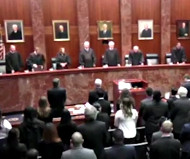5/8/2019
Texas Supreme Court Punts On Red Light CamerasInstead of deciding on legality of red light camera program, Texas Supreme Court throws out case on procedural grounds.

Cities in Texas can continue ignore the law when they operate red light cameras. The state Supreme Court on Friday threw out the most significant challenge to the programs to date on narrow technical grounds, saying the broader questions about the use of automated ticketing "are not at issue today."
The high court only considered whether it was appropriate for motorist Luis Garcia to file a lawsuit against the photo ticketing program in the city of Willis, with the justices on their own initiative introducing a new argument that, while Garcia can get a refund for his ticket, he cannot prevent future tickets from being issued.
"Although the standing doctrine does not foreclose Garcia's retrospective claims, we conclude he has no standing to bring his prospective claims," Justice Jeffrey V. Brown wrote for the court.
Attorney Russell J. Bowman filed the challenge on Garcia's behalf after realizing that Willis is one of several cities that failed to conduct the legally required, formal study of engineering alternatives prior to installing the red light cameras. The legislature mandated these studies in 2007 as a way to protect citizens from unscrupulous cities seeking to use cameras solely as a means of generating revenue (view law). The statute says that the city may not impose a penalty unless the study and other requirements are met.
"You've got the statute directly prohibiting the very thing the city did," Bowman explained during oral argument.
The justices insisted that Garcia could not even bring that question before the court.
"Garcia may earnestly believe that red-light cameras are both unconstitutional and bad public policy," Justice Brown wrote. "But, having paid his fine without arguing he will potentially break the law in the future, he has no particularized interest in the issue distinguishable from a member of the public at large."
Because Garcia and Bowman skipped over the city-run administrative hearing and took their case directly to district court, the high court refused to rule on the constitutionality of the program in Willis.
"The question here is not whether an administrative hearing could have resolved all of his claims, constitutional or otherwise," Justice Brown concluded. "The hearing officer might have agreed, for instance, that the city lacked authority to impose fines without completing the statutorily required traffic study."
The ruling leaves open the possibility that an identical suit could be filed with a plaintiff who went through the hearing and asserts an intention to accumulate more red light camera tickets.
A copy of the ruling is available in a 100k PDF file at the source link below.


